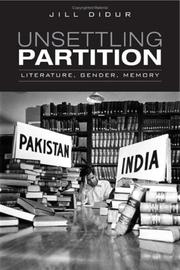| Listing 1 - 1 of 1 |
Sort by
|

ISBN: 1281997714 9786611997717 1442682957 9781442682955 9781281997715 0802079970 9780802079978 1442638257 1442615052 Year: 2006 Publisher: Toronto : University of Toronto Press,
Abstract | Keywords | Export | Availability | Bookmark
 Loading...
Loading...Choose an application
- Reference Manager
- EndNote
- RefWorks (Direct export to RefWorks)
The Partition of India in 1947 marked the birth of two modern nation-states and the end of British colonialism in South Asia. The move towards the 'two nation solution' was accompanied by an unprecedented mass migration (over twelve million people) to and from areas that would become India and Pakistan. Diverse representations of the violence that accompanied this migration (including the abduction and sexual assault of over 75,000 women) can be found in fictional, historical, autobiographical, and recent scholarly works. Unsettling Partition examines short stories, novels, testimonies, and historiography that represent women's experiences of the Partition. Counter to the move for 'recovery' that informs some historical research on testimony and fictional representations of women's Partition experiences, Jill Didur argues for an attentiveness to the literary qualities of women's narratives that interrogate and unsettle monolithic accounts of the period. Rather than attempt to seek out a 'hidden history' of this time, Didur examines how the literariness of Partition narratives undermines this possibility. Unsettling Partitions reinterprets the silences found in women's accounts of sectarian violence that accompanied Partition (sexual assault, abduction, displacement from their families) as a sign of their inability to find a language to articulate their experience without invoking metaphors of purity and pollution. Didur argues that these silences and ambiguities in women's stories should not be resolved, accounted for, translated, or recovered but understood as a critique of the project of patriarchal modernity.
Indic fiction --- Partition, Territorial, in literature. --- Gender identity in literature. --- Violence in literature. --- Nationalism in literature. --- Women in literature. --- Woman (Christian theology) in literature --- Women in drama --- Women in poetry --- History and criticism. --- India --- History --- Roman indien (de l'Inde) de langue anglaise --- Littérature indienne (de l'Inde) de langue anglais --- Inde --- Démembrement des nations --- Identité sexuelle --- Violence --- Nationalisme --- Femmes --- 20e siècle --- Histoire et critique --- Thèmes, motifs --- 1947 (Partition) --- Dans la littérature
| Listing 1 - 1 of 1 |
Sort by
|

 Search
Search Feedback
Feedback About UniCat
About UniCat  Help
Help News
News